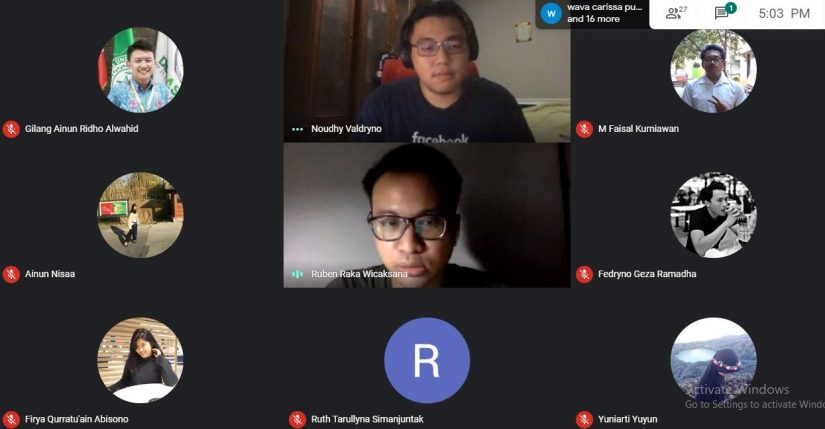
Yogyakarta, 4 July 2020—UGM’s Center for Digital Society organized the forty-first Digitalk, together with Noudhy Valdryno—serving as Politics and Government Outreach for Facebook Indonesia and Asia Pacific—as the speaker, under the theme of “Facebook’s Role in the Era of COVID-19 Pandemic” (3/7). Noudhy explained that Facebook Indonesia stands on three main pillars, which include helping small-medium enterprises/SMEs, building communities, and supporting effective digital government.
With 2,45 billion users, Facebook is one of the most influential social media platforms in the world. Amidst the pandemic that obliges people to engage in digital activities, Facebook serves to provide accurate information for its users, as well as a platform to run businesses, particularly for SMEs.
In the middle of the pandemic when digital activities increase, Noudhy noted, Facebook makes sure three aspects are functional. First, Facebook ensures users’ access to accurate information 24 hours a day. It also supports economic recovery, especially for SMEs. Lastly, it keeps its performance stable amidst increase of usage.
Regarding access of information, Facebook collaborated with WHO and the Ministry of Health in enabling the Center for COVID-19 Information. It also provides accurate information through the COVID-19 bot feature in Whatsapp and Messenger. In addition, a new product named Data For Good was released. Through Data for Good, Facebook processes cluster data, i.e. movement patterns during large-scale social distancing. Later, the data will be shared with non-profit organizations and scholars to be analyzed, for instance, to conclude government intervention and policies’ effectiveness in tackling COVID-19. UGM, Center for Strategic and International Studies/CSIS and Universitas Indonesia are a few of Facebook’s partners who have utilized the data.
Similar with other social media platforms, Facebook also faced challenges during the pandemic, including misinformations. Noudhy stated that Facebook had made efforts to handle the issue. First, Facebook worked with third-party fact-checkers, consisting of Indonesian local media. Facebook will immediately notify partners to verify contents with elements of misinformation. Second, Facebook made sure contents of misinformation will be reduced up to eighty percent from Facebook home. Moreover, notifications will pop when someone is about to upload contents of misinformation.
Despite said efforts, contents of misinformation continues to circulate. Noudhy added that, even if the technology is well-developed, misinformation will be hard to stop if the people are not equipped with good literacy. “The fight against misinformation can only be won with digital literacy. It is, definitely, not instant. Relentless attempts have to be done through collaborations with social institutions,” Noudhy remarked. Different from hoax and hate speech that can be easily detected and deleted, misinformation needs further verification. Hence, people need to be careful in distributing information.
In the economic sector, Facebook offers a platform for SMEs to promote and sell their products digitally through its products, including WhatsApp Business, Instagram’s Promote Post, and Facebook Marketplace. Noudhy suggested that SMEs join different courses available to utilize said products in order to survive during the pandemic.
We need to continuously strive for good literacy and competence in using digital media, not only to stop the distribution of false information, but also to reduce fake and deceitful accounts on Facebook. Wrapping up the session, Noudhy suggested that the people need to directly contribute to the fight against misinformation, i.e. by making reports of such misinformation and fake accounts.
